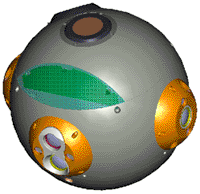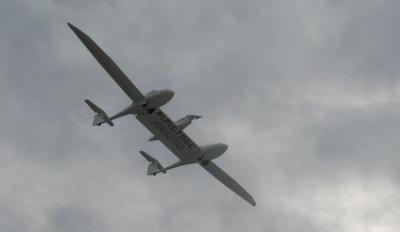Space Flight Challenge Competition Encourages Innovation In
Propulsion, Other Technologies
NASA has signed an agreement with the Space Florida Small
Satellite Research Center of Cape Canaveral, FL, to manage the
Nano-Satellite Launch Challenge, one of the agency's new Centennial
Challenges prize competitions.

The Nano-Satellite Launch Challenge is to launch satellites with
a mass of at least 2.2 pounds (1 kg) into Earth orbit, twice within
the span of one week. The new challenge has a NASA-provided prize
purse of $2 million.
The objective of the competition is to encourage innovations in
propulsion and other technologies, as well as operations and
management relevant to safe, low-cost, small payload delivery
system for frequent access to Earth orbit. Innovations stemming
from this challenge will be beneficial to broader applications in
future launch systems. They may enhance commercial capability for
dedicated launches of small satellites at a cost comparable to
secondary payload launches -- a potential new market with
government, commercial, and academic customers.
"Monday's agreement between NASA and Space Florida for use of
facilities at the Kennedy Space Center even better positions the
organization for managing this new Nano-Satellite Launch
Challenge," said Michael Gazarik, director for NASA's Space
Technology Program at NASA Headquarters in Washington. "Space
Florida has extensive experience working with NASA, the FAA, the
Air Force, commercial spaceflight companies and universities to
advance their plans for spaceflight operations. We look forward to
having the Space Florida Small Satellite Research Center overseeing
the competition and bringing together innovative teams with
creative problem-solving ideas."
Nano Satellite File Photo

Space Florida submitted a proposal last spring in response to a
NASA solicitation for this partnership opportunity. They will now
begin detailed preparations for the challenge, publishing rules and
then registering competitors. The first competition launch attempt
is expected to take place in the summer of 2012.
The Centennial Challenges seek unconventional solutions to
problems of interest to NASA and the nation. Competitors have
included private companies, student groups and independent
inventors working outside the traditional aerospace industry.
Unlike contracts or grants, prizes are awarded only after solutions
are successfully demonstrated.
NASA's Centennial Challenges program provides the prize purse
for the technology and innovation competitions. The competitions
are managed by non-profit organizations that cover the cost of
operations through commercial or private sponsorships.
Pipistrel Tarus G4

In October, NASA awarded the largest prize in aviation history
following Pipistrel-USA's win of the agency's CAFE Green Flight
Challenge, sponsored by Google. NASA's $1.35 million first prize
and a $120,000 second prize recognized competitors using electric
airplanes to break all previous fuel efficiency records. The
technology and innovation used in electric aircraft may end up in
general aviation aircraft, spawning new jobs and new industries for
the 21st century.
There have been 22 Centennial Challenges competition events
since 2005. NASA has awarded nearly $6 million to 15 different
challenge-winning teams. Centennial Challenges is one of the ten
Space Technology programs, managed by NASA's Office of the Chief
Technologist. For more information about the program and
descriptions of each of the challenge competitions, visit:
 ANN's Daily Aero-Linx (04.16.24)
ANN's Daily Aero-Linx (04.16.24) Aero-News: Quote of the Day (04.16.24)
Aero-News: Quote of the Day (04.16.24) Airborne 04.10.24: SnF24!, A50 Heritage Reveal, HeliCycle!, Montaer MC-01
Airborne 04.10.24: SnF24!, A50 Heritage Reveal, HeliCycle!, Montaer MC-01 Airborne 04.12.24: SnF24!, G100UL Is Here, Holy Micro, Plane Tags
Airborne 04.12.24: SnF24!, G100UL Is Here, Holy Micro, Plane Tags Airborne-Flight Training 04.17.24: Feds Need Controllers, Spirit Delay, Redbird
Airborne-Flight Training 04.17.24: Feds Need Controllers, Spirit Delay, Redbird





